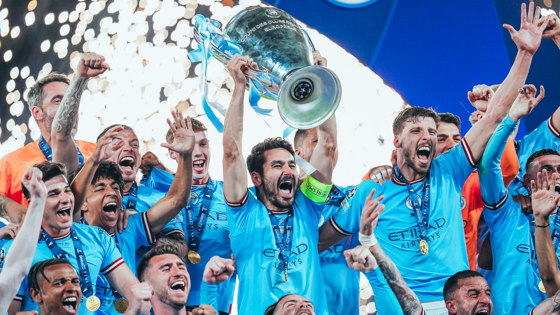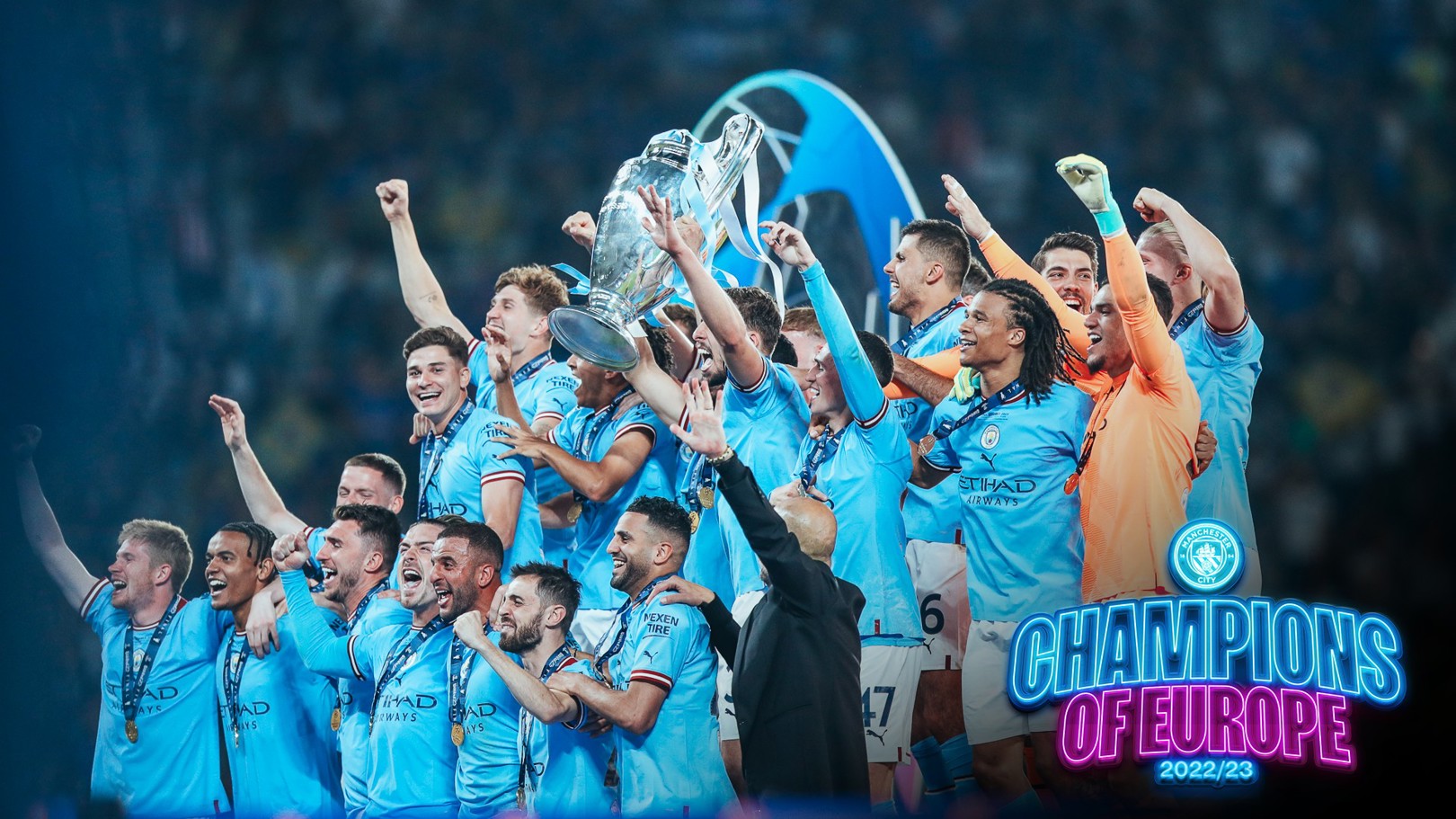It’s the game’s ultimate club prize – the pinnacle of European football - and this win secures a glorious Treble of Champions League, Premier League and FA Cup in what has been the greatest season in the history of Manchester City.
But this victory in Europe hasn’t come easy. Since qualifying for the first time in 2011, there have been more lows than highs. Two chastening group-stage exits under Roberto Mancini. The insipid semi-final defeat to Real Madrid in 2016 that meant Manuel Pellegrini’s final weeks in charge would end with a whimper. The dramatic and unceremonious quarter-final loss at the hands of Tottenham in 2019, which ended in VAR controversy. The defeat in our first final in 2021 against a Chelsea side many felt we were superior to. And, perhaps most crushing of all, last season’s semi-final defeat to Real Madrid that saw us uncharacteristically concede late goals before losing on aggregate.
All those disappointments, part of a steep learning curve in the most unforgiving of competitions, have now dissipated into the Istanbul night sky.
Not since Joe Mercer and Malcolm Allison’s fearless squad of 1970 have we triumphed on the continent. Then it was the Cup Winners’ Cup, secured at the Prater Stadion in Vienna after a 2-1 win over Polish side Gornik Zabrze. The Class of 1970 surely could not have predicted it would be more than a half century before more silverware earned on foreign soil would find its way into the club’s trophy cabinet.
City have been outstanding throughout the entirety of this season’s campaign and few could argue we are worthy winners. We topped Group G with two matches to spare, dismantled RB Leipzig in the last-16 with a quite remarkable 8-1 aggregate scoreline, before comfortably moving past Bayern Munich and Real Madrid – widely considered to be the two strongest sides standing in our way – in the quarter final and semi final respectively. Heading into the final, City had registered seven wins, five draws and no defeats, with 31 goals scored and just five conceded.
All of which meant we were heavy favourites against Inter, but finals demand focus and mental fortitude. Fortunately, this City side, blended by the expert management of Guardiola, has that in spades. “We love the pressure,” Ruben Dias said the night before at his pre-match press briefing. “We are all captains and we can all step up when the time is right. It’s a special characteristic our team has. Credit goes out to the club because they were able to get together a group of players who everyone in their own context were all leaders.”
Where in 2021 City underperformed, there was no such problem on this occasion. A frustrating first half that saw Inter stymie our creativity was followed by a commanding second-half display.
It was fitting, too, that Istanbul provided the backdrop for City’s first ever Champions League win – the same city that played host to our first game in the European Cup back in 1968 when a side containing Francis Lee, Mike Summerbee and Colin Bell lost to Fenerbahce.

Home to almost 16 million and straddling both Europe and Asia, the Champions League final was twice moved from this great city, once in 2020 and then again in 2021. As a result, it’s provided the hook for terrace chants for the past three years and there has long been a feeling among City’s fanbase that we would, one day, hold the trophy aloft here in Istanbul.
It’s a vibrant metropolis that reflects aspects of Pep Guardiola’s talented squad, particularly the Sultan Ahmed Mosque, a wonderfully lavish example of Ottoman architecture, built in 1616 and a UNESCO World Heritage Site since 1985. Its designer, Mehmed Ağa, was clearly given artistic freedom. It’s built to last, revered the world over and draped in soft blue.
And what of Guardiola, the orchestrator of this golden era in City’s generation and now, surely, considered the greatest coach this wonderful sport has ever produced? He was already part of an elite group of nine managers to win a Treble with a European side after his wonderful Barcelona team swept the board in 2009. He now stands alone as the only person to ever manage that feat on two occasions, football’s Holy Grail achieved twice in the space of 14 years.

He won’t want to look ahead right now – he prefers to enjoy these moments before relaxing and recuperating during the offseason – but next year he has the chance to become the first manager in the history of English football to win four league titles in succession, as well as lead City in their first ever European Super Cup and FIFA Club World Cup appearances. It’s a tantalising prospect for City fans the world over.
The Catalan is the mastermind behind the operation. His obsession with the game has seen him develop a tactical understanding few in the history of football can match. His philosophy was borne out of his relationship with Johan Cruyff, his manager at Barcelona in the 90s and his mentor until the Dutchman’s passing in 2016.
“Without Johan Cruyff, I wouldn’t be here,” he said. “I know, for sure, this why I am, right now, the manager of Manchester City and before that Bayern Munich and Barcelona.”
The principles laid out by Cruyff are still evident today, but Guardiola has also carved his own style. His success in his seven seasons at City have elevated his standing, which was already at an elite level after success-laden periods in charge of Barcelona and Bayern Munich.
He oversaw the first 100-point title-winning season English football history in 2018 and followed that up by winning all four domestic trophies in 2019, a feat never managed before. And now a glorious Treble and surely his finest achievement since joining City in 2016.

He is only the third manager to win the Champions League on three occasions, joining Carlo Ancelotti, who has four (2003, 2007, 2014, 2022), and Zinedine Zidane (2016, 2018, 2019) on an illustrious list. He is only the fifth coach to win the competition with two different clubs. Crucially, though, he is the first City manager to achieve the feat.
If Pep is the mastermind, Ilkay Gundogan is the inspiration, a midfielder of grace and majesty whose intelligence and vivid tactical understanding of football allow him to excel. He has finished the season with 11 goals in all competitions, with his flurry of seismic performances in the final months of the season a key contribution in what’s been a long, draining campaign. He delivered a typically fluid display inside the Ataturk.

Erling Haaland has added an edge to our attack and has 52 goals to show for his first season at the club. John Stones is now the most accomplished centre-back in Europe, one who spent the two legs of the semi-final dictating play on the edge of the Real Madrid box. Dias has been a rock, with his return to the side seemingly a catalyst for drastically improved form. Rodri has played a remarkable 55 matches and barely put a foot wrong, so how fitting he should score the winner in the biggest game of his career. And Kevin De Bruyne is now firmly entrenched in the pantheon of English football greats.

The fact there are so many names deserving of mention reflects Guardiola’s inclusive rotation policy. All the players have been used – the schedule in this strange winter World Cup year was too unrelenting not to – and as a result the side has remained fresh, with every player feeling they have had an impact. The goals and minutes have been spread around. It’s been a true collective effort.
So what now for this City side, who have won 13 of the last 23 domestic trophies available and are now Kings of Europe? That’s a conversation for another day. After more than 10 years of European setbacks and questions being asked, it’s time to enjoy our position at the pinnacle of football.






